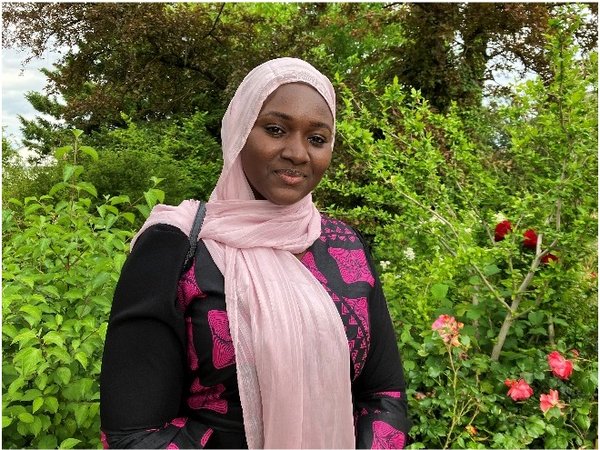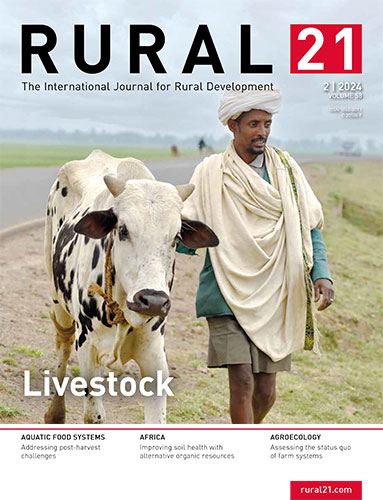 Read this article in French
Read this article in French- Share this article
- Subscribe to our newsletter
The GIZ Women Leadership Program – holding together and learning from each other
Since 2023, the global project has been supporting leadership training for women in farmers’ organisations in Africa. The PanAfrican Farmers' Organisation (PAFO), seated in Kigali/Rwanda, is in charge of the Women Leadership Program, which is conducted in partnership with the Andreas Hermes Akademie (AHA) in Berlin/Germany as an education institution of the Deutscher Bauernverband (DBV) (German Farmers’ Association) and the Deutscher LandFrauenverband e.V. (dlv – German Rural Women’s Association).
Once a year, around 20 women are selected from farmers’ organisations in partner countries for further education in leadership. Following an initial successful round in 2023, the second round was held this year. It started in the German Federal State of Bavaria in May and was followed by online training programmes. The programme is to be concluded in the Rwandan capital of Kigali in November 2024.
“This programme, which has been specially designed for women, is well suited to contribute to putting the Federal Government’s ideas regarding feminist development cooperation into practice,” says Ursula Braunewell, State Chair of the LandFrauenverband Rheinhessen e. V. and first Vice-President of the dlv. Braunewell adds that the programme is also going to have an important multiplier effect. For the women taking part in it can pass on their experiences at the workshop in their countries and form new networks, she argues.
In addition to these annual workshops, since 2016, the AHA, and since 2023, the dlv have been independently implementing measures with farmers’ organisations in Uganda. Together with the Young Farmers’ Federation of Uganda (UNYFA), the dlv is directly cooperating with women farmers in leading positions. Furthermore, there are exchange formats between Ugandan and German farmers incorporating visits to each other’s farms and learning from one another.
Women’s Leadership Programme 2024 – women farmers sharing experiences and getting to know what’s new
At the one-week workshop in Bavaria in May, 20 women from throughout Africa met in order to get fit to assume management positions in their organisations. One topic women across countries are concerned with is climate change, but so are violence against women and their being at a disadvantage in agriculture.
This year, Aichatou Sakho from Mauritania is the programme’s youngest participant. Together with her father, the 26-year-old grows rice and vegetables and is a member of the Maghrebian and North African Farmers Union (UMNAGRI). “Already the fact that I have left Mauritania to obtain further education in leadership here is a positive aspect,” says Aichatou, whose father proposed that she take part in the programme. “He encourages me every day, for which I am very grateful to him.” Only recently, she started a business of her own – selling spice mixtures. In addition, with her father and her younger brothers, she wants to enter dairy production. Creating a broad base pays its way, for in Mauritania too, climate change is making life hard for farmers.
Aichatou Sakho looks forward optimistically. “What I seek is to become a leader, and that’s why I have joined this course,” she says. “Of course it will still take a while. But maybe I can offer other women further education, grow with them, and become a great leader.”
There is still a long way to go before justice for women in agriculture has really been achieved, as Lami Madjedje, President of the National Network of Women Farmers in Togo (RENAFAT Centrale), part of the Regional Umbrella Association of Farmers’ Organisations in West Africa (ROPPA), stresses. In Central Togo, she grows manioc, grain, maize and soy. “You can rent tractors, but this is especially difficult for us because we have no access to equipment, training and land,” Lami says.
The roads are in bad repair, she complains, and explains that with her organisation, she engages in lobbying activities and addresses the problems, although much support and training is still needed for the women, which is where the Women Leadership Programme comes in. “My vision is that I will share the experience that I have gained from other women from other countries and continents,” Madjedje says. “As a leader, I have to strive to get other women into our network. I must give something back. I must let them take part so that they are at the same level of information. This will bring the functionality of our network to perfection.”
While the programme is to be concluded with the round in late 2024, with the aid of chat groups, the former participants can keep in touch, Ursula Braunewell of the LandFrauenverband Rheinhessen e. V. notes. “This is really nice, for we have all wished to stay in contact and maintain the opportunity to learn more together and share experiences beyond the project. And that is working,” she says.
Author: Claudia Jordan, Deutsche Gesellschaft für internationale Zusammenarbeit (GIZ) GmbH, Bonn/Eschborn, Germany. Contact: Claudia.jordan@giz.de





Add a comment
Be the First to Comment